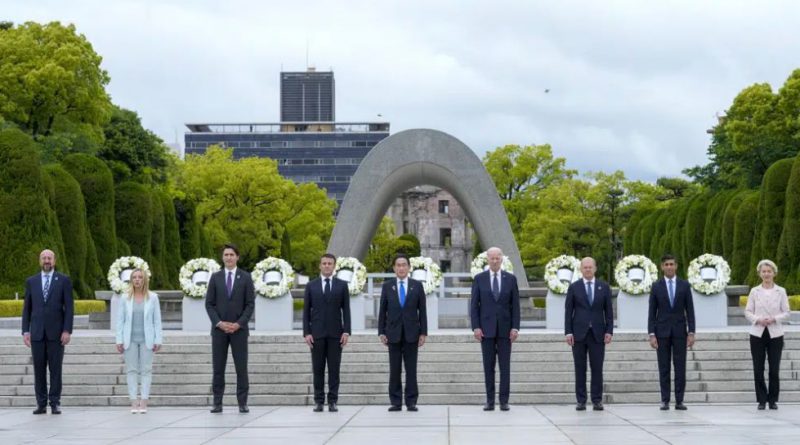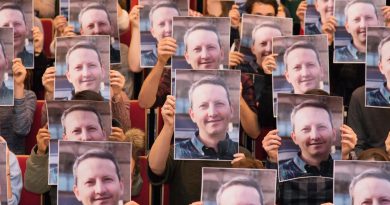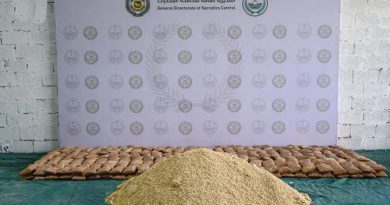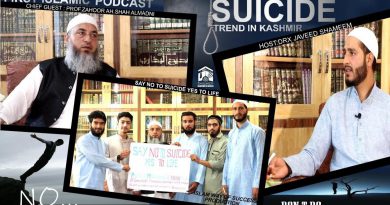Zelenskyy to attend G7 summit Sunday as world leaders tighten sanctions against Russia over Ukraine
Hiroshima (AP) — Leaders of the world’s most powerful democracies vowed Friday to tighten punishments on Russia for its 15-month invasion of Ukraine, days before President Volodymyr Zelenskyy joins the Group of Seven summit in person on Sunday.
“Our support for Ukraine will not waver,” the G7 leaders said in a statement released after closed-door meetings, vowing “to stand together against Russia’s illegal, unjustifiable, and unprovoked war of aggression against Ukraine.”
“Russia started this war and can end this war,” they said.
Oleksiy Danilov, secretary of Ukraine’s National Security and Defense Council, confirmed on national television that Zelenskyy would attend the summit.
“We were sure that our president would be where Ukraine needed him, in any part of the world, to solve the issue of stability of our country,” Danilov said Friday. “There will be very important matters decided there, so physical presence is a crucial thing to defend our interests.”
Zelenskyy announced Friday that he had opened a visit to Saudi Arabia, where Arab leaders were holding a summit.
Russian President Vladimir Putin’s nuclear threats against Ukraine, along with North Korea ’s months-long barrage of missile tests and China’s rapidly expanding nuclear arsenal, have resonated with Japan’s push to make nuclear disarmament a major part of the G7 summit. World leaders Friday visited a peace park dedicated to the tens of thousands who died in the world’s first wartime atomic bomb detonation.
After group photos near the city’s iconic bombed-out dome, a wreath-laying and a symbolic cherry tree planting, a new round of sanctions were unveiled against Moscow, with a focus on redoubling efforts to enforce existing sanctions meant to stifle Russia’s war effort and hold accountable those behind it, a U.S. official said. Russia is now the most-sanctioned country in the world, but there are questions about the effectiveness of the financial penalties.
The U.S. component of the actions would blacklist about 70 Russian and third-country entities involved in Russia’s defense production, and sanction more than 300 individuals, entities, aircraft and vessels, said a U.S. official, who spoke on condition of anonymity to preview the announcement.
The official said the other G7 nations would undertake similar steps to further isolate Russia and to undermine its ability to wage war in Ukraine. Details were to emerge throughout the weekend summit.
The G7 nations said in Friday’s statement that they would work to keep Russia from using the international financial system to prosecute its war, would “further restrict Russia’s access to our economies” and would prevent sanctions evasion by Moscow.
They urged other nations to stop providing Russia with support and weapons “or face severe costs.”
The European Union was focused on closing loopholes and plans to restrict trade in Russian diamonds, Charles Michel, president of the European Council, told reporters Friday.
The UK also announced new sanctions that freeze the assets of 86 people and organizations connected to Russia’s energy, metals, defense, transport and financial sectors.
“We need to give Ukraine the tools now to successfully defend itself and regain full sovereignty and territorial integrity. We should provide Ukraine the necessary military and financial support. And we have to do this as long as it takes,” EU Commission President Ursula von der Leyen said.
Japanese Prime Minister Fumio Kishida, who represents Hiroshima in parliament, wants nuclear disarmament to be a major focus of discussions, and he formally started the summit at Hiroshima’s Peace Memorial Park. The visit by world leaders to a park dedicated to preserving reminders of Aug. 6, 1945, when a U.S. B-29 dropped an atomic bomb over Hiroshima, provided a striking backdrop to the start the summit. An estimated 140,000 people were killed in the attack, and a fast-dwindling number of now-elderly survivors have ensured that Hiroshima has become synonymous with anti-nuclear peace efforts.
“Honestly, I have big doubts if Mr. Kishida, who is pursuing a military buildup and seeking to revise the pacifist constitution, can really discuss nuclear disarmament,” Sueichi Kido, a 83-year-old “hibakusha” or survivor of the Nagasaki explosion, told The Associated Press. “But because they are meeting in Hiroshima I do have a sliver of hope that they will have positive talks and make a tiny step toward nuclear disarmament.”
Biden, who scrapped plans to travel on to Papua New Guinea and Australia after his stay in Japan so that he can get back to debt limit talks in Washington, arranged to meet Saturday on the G-7 sidelines with leaders of the so-called Quad partnership, made up of Japan, Australia, India and the U.S.
The four originally had been scheduled to meet in Australia as part of Biden’s effort to revitalize relationships in the Indo-Pacific.
On Thursday night, Kishida opened the global diplomacy by sitting down with President Joe Biden. Kishida also held talks with British Prime Minister Rishi Sunak.
The Japan-U.S. alliance is the “very foundation of peace and security in the Indo-Pacific region,” Kishida told Biden. Japan, facing threats from authoritarian China, Russia and North Korea, has been expanding its military but also relies on 50,000 U.S. troops stationed in Japan and U.S. military might.
“We very much welcome that the cooperation has evolved in leaps and bounds,” Kishida said.
Biden said: “When our countries stand together, we stand stronger, and I believe the whole world is safer when we do.”
As G7 attendees made their way to Hiroshima, Moscow unleashed yet another aerial attack on the Ukrainian capital. Loud explosions thundered through Kyiv during the early hours, marking the ninth time this month that Russian air raids have targeted the city after weeks of relative quiet.
The United States has frozen Russian Central Bank funds, restricted banks’ access to SWIFT — the dominant system for global financial transactions — and sanctioned thousands of Russian firms, government officials, oligarchs and their families.
The Group of Seven nations collectively imposed a $60 per-barrel price cap on Russian oil and diesel last year, which the U.S. Treasury Department on Thursday defended in a new progress report, stating that the cap has been successful in suppressing Russian oil revenues. Treasury cites Russian Ministry of Finance data showing that the Kremlin’s oil revenues from January to March this year were more than 40% lower than last year.
The economic impact of sanctions depends largely on the extent to which a targeted country is able to circumvent them, according to a recent Congressional Research Service repor t. So for the past month, U.S. Treasury officials have traveled across Europe and Central Asia to press countries that still do business with the Kremlin to cut their financial ties.
“The challenge is to make sure the sanctions are painful against Russia, not against ourselves,” said Michel. “It’s very clear that each package is more difficult than the previous one and requires more political effort to make a decision.”
G7 leaders and invited guests from several other counties are also expected to discuss how to deal with China’s growing assertiveness and military buildup as concerns rise that it could could try to seize Taiwan by force, sparking a wider conflict. China claims the self-governing island as its own and its ships and warplanes regularly patrol near it.
In a bit of dueling diplomacy, Chinese President Xi Jinping is hosting the leaders of the Central Asian countries of Kazakhstan, Kyrgyzstan, Tajikistan, Turkmenistan and Uzbekistan for a two-day summit in the Chinese city of Xi’an.
The leaders are due to discuss efforts to strengthen the global economy and address rising prices that are squeezing families and government budgets around the world, particularly in developing countries in Africa, Asia and Latin America.
The G7 includes Japan, the United States, the United Kingdom, France, Germany, Canada and Italy, as well as the European Union.
Associated Press writers Josh Boak, Adam Schreck and Mari Yamaguchi in Hiroshima, Japan, Raf Casert in Brussels, Hanna Arhirova in Kyiv, Ukraine, and Fatima Hussein in Washington contributed to this report.



